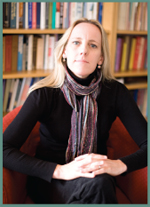The Young Nones: Unstereotypical and Alright

Admittedly, the older I get the less I understand the younger generation. And yet I see how important it is to resist what Bertolt Brecht was getting at in his famous quip: “Youth is when you blame your troubles on your parents; maturity is when you learn that everything is the fault of the younger generation.”
In other words, neither the young nor the old can be expected to solve everyone’s problems. And this is just as true within the secular movement.
Much has been made of the fact that young people increasingly claim no religious affiliation. Millennials aren’t so much “spiritual but not religious” as they’re simply not religious. We call those who check the “NONE” box when asked their religious affiliation the “nones” (and when you say it out loud it sounds like you’re referring to a bunch of nuns, which is probably a big reason why the name stuck.)
In Pew’s 2014 Religious Landscape Survey, only 17 percent of baby boomers identified their current religion as atheist, agnostic, or nothing in particular. In contrast, 34 percent of older millennials (born between 1981 and 1989) and 36 percent of younger millennials (b. 1990-1996) identified as such. How, the graying, card-carrying members of the secular movement ask, can we attract all these young nones to humanism?
As friendly atheist Hemant Mehta, the subject of this issue’s Humanist Profile, wisely suggests, we must understand the issues and problems young nones face. We must, as Greta Christina lays out in her Fierce Humanism column, reject ageism and seek participation and leadership from secular people of all ages. And we must, as echoed by Sikivu Hutchinson and the young black humanist scholars she introduces herein, move beyond the stereotype of young nones as white, Western, anti-religious, or even existing on the far left of the political spectrum.
In short, we must get to know people who aren’t just millennials eschewing religion but who are also environmental activists, members of a racial minority, students (or former students with overwhelming student loan debt and/or poor job prospects), vegans, cancer survivors, gamers, omnivores, writers, feminists, transgendered teenagers, ex-Muslims, rebels, geeks, political junkies, nonvoters—or a combination of that lot or another.
The humanist movement should also listen to the young voices (some of whom you’ll hear in this issue) who want us to engage in activities that are more public than we’re used to. “That’s the most important thing—for everybody to know where you are,” says humanist teenager Tani Hale, who thinks the American Humanist Association should have a Snapchat Geofilter for its next conference. And so, knowing where young nones are at and increasing humanist visibility go hand in hand.
Enlightenment can come at any age. And to say you’re still learning, still evolving personally, is, I think, a very humanist stance. We can likewise learn from the young founders of the Ex-Muslims of North America, interviewed at the AHA’s 75th Annual Conference in Chicago; from Frieder Otto Wolf and humanist groups in Germany that actively educate and celebrate their young people while also providing wider community support; and from a young atheist activist named Cidney Fisk, whose name, I have a feeling, is one you’ll be hearing again.
The other night I was telling my daughter about a cartoon I saw where a parent and his teenage son were sitting across from each other but communicating by text. “I’m really worried about the younger generation,” she said. Which is funny because my daughter’s only eleven. But she was talking about the ones who’ll be able to vote in 2020. Judging from the young nones I’ve met in this issue, I’m not so worried. I’ll just go ahead and say it: the kids are alright.
